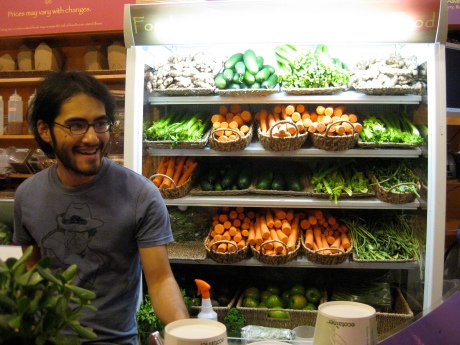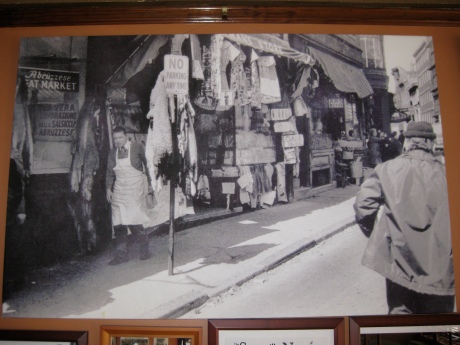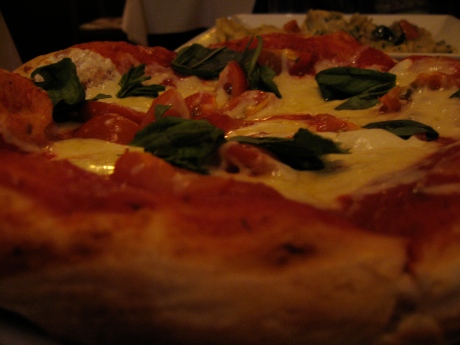Symbolic Expression
March 13, 2012
 Walking into Saus was like going to Roberta’s in Brooklyn or Myers & Change in the South End (Boston). There was an immediate realization of the artsy, upfront, yet relaxed vibe of comfortable fusion. X cuisine and American cuisine, fast with fresh, nostalgic yet progressive, global and local. Framed Tin Tin comics are art for one long wall of this rectangular restaurant, courtesy of Amazon.com. A local photographer displays his work on the wall opposite. Professionally hand drawn chalk board menus give confidence that the owners took serious consideration to their offerings.
Walking into Saus was like going to Roberta’s in Brooklyn or Myers & Change in the South End (Boston). There was an immediate realization of the artsy, upfront, yet relaxed vibe of comfortable fusion. X cuisine and American cuisine, fast with fresh, nostalgic yet progressive, global and local. Framed Tin Tin comics are art for one long wall of this rectangular restaurant, courtesy of Amazon.com. A local photographer displays his work on the wall opposite. Professionally hand drawn chalk board menus give confidence that the owners took serious consideration to their offerings.
The late-night stop offers french fries and waffles. Thanks to the Belgian standard of multiple dipping sauces, Americans at Saus can happily choose from over 10 varieties, all made in-house. The menu is rounded out with cafe fair and draught beer.
I’m feeling friendly this very early Saturday morning in very early March and one of the cooks is sporting a cubs hat. Porteshawver official policy to talk to cubbies. All of the staff was friendly and laid back. You could tell they took their jobs seriously and wanted to be there. One employee talks with me as she prepares pommes frites–a true test. Only the best can work efficiently while chatting. At this point a serious line has formed and I’m soon to step off my anthropology box to leave the cook staff to it. The young woman salts some just fried, frenched potatoes in a funnel-shaped pan and pours them into a white paper cone, stamped in blue with the Saus logo–a nice touch. She’s explaining the struggle between buying power and the desire to source food locally.
Somehow, Saus gives off the foodie imagery without approaching disingenuous, even without a local food purchasing plan. I think it’s the attention to detail in presentation, the highlighting of fresh ingredients, and the on-site preparation of everything. Employee honesty certainly helped. The woman, most likely a foodie herself, tilted her head apologetically as she told me they use a distributor. There are some local connections. Pastry chef from Sofra/Flour bakery provides the waffle recipe, for instance. The place was started by three food-daydreaming friends who found themselves jobless and ready to promote a culture (Belgian grub) they loved.
 I wrote about symbolic expression in my previous two posts. It’s the notion of using images, vocabulary, and histories to show support of a community, while not necessarily promoting it in practice. The sort of unapologetic symbolic expression practiced by Saus has the potential to be constructive. The restaurant offers process-focused food with good customer service. They have vegetables and herbs (parsley vinaigrette!) They promote some of the ideals of local food, but don’t serve it. Before people buy fresh and local they must think fresh and local. Places like Saus can help this consciousness shift.
I wrote about symbolic expression in my previous two posts. It’s the notion of using images, vocabulary, and histories to show support of a community, while not necessarily promoting it in practice. The sort of unapologetic symbolic expression practiced by Saus has the potential to be constructive. The restaurant offers process-focused food with good customer service. They have vegetables and herbs (parsley vinaigrette!) They promote some of the ideals of local food, but don’t serve it. Before people buy fresh and local they must think fresh and local. Places like Saus can help this consciousness shift.
However, symbolic expression can only go so far. What are the real access barriers to local food for Saus? As they become more popular and ramp up the oft-cited excuse of buying power, will they have the know-how and infrastructure to redirect their purchasing? What local farms deliver to the North End?
Let’s take another example of symbolic expression that is less constructive. Egg Cetera in Framingham is a breakfast joint with the slogan “A farm stand in a pan”. Rather than mobilizing the fresh aesthetic of local food like Saus, Egg Cetera re-appropriates foodie terms to get people in the room. With that slogan, though, how could I not give Egg Cetera a try. Idyllic photos of cows, farms, and chickens are mounted on the walls. They look like they came from a sample brochure made by a farm advertising firm. The food from Egg Cetera certainly didn’t come from those farms–it was sub-fresh, very (pre-?) chopped out-of-season vegetables, meats and cheeses sitting in a salad bar-like set up. You fill up little paper cups with what you want and the boys will fry you up an omelet. Checkered picnic print, stuffed animal chickens, and for-show teflon pans top it all off. The whole experience was tacky, and down right upsetting: after ordering I saw a teeny tiny sign that read “Cage Free Eggs $0.54 Extra”. The “Employees Only” plaques in the back pretend there is a farm behind the doors. I highly doubt even the buyer knows from which farm the eggs come. They too, use a distributor.
Both these restaurants mobilize symbolic expression of foodiedom, but in very different ways and to different ends. Not to say that all distributors are created equal, but essentially, the food comes from the same place: the innumerable farms of the global economy.
However, this stark contrast between the “party of the local community” vs. the “party of the global economy” doesn’t hold up to fusion, at least in the case of Saus. No doubt sharing the momentum of Carrotmob, Scoutmob is an advertising and mobile deal company focused on independent businesses. They’re posted in over 20 major U.S. cities, where they encourage folks to patron locally owned spots by administering sweet deals. Actually, I went to Saus because of one of them. My environmental economist friend excitedly took out her iPhone at mention of late night munchies. We spoke about this type of economic persuasion as a social movement. The advertising firm has the power to push people into stores that support their philosophies, business ethics, environmental standards, you name it. Indeed, participating in Scoutmob is symbolic expression in and of itself.
Live your Life Alive in Cambridge
November 2, 2010
Great news! The all-natural cafe Life Alive just opened a place in Cambridge’s Central Square. The restaurant still has its original location in downtown Lowell, where devoted eaters have enjoyed the relaxing and artsy establishment for years. Life Alive is an eatery with a mission
“We are here to renew your energy and connection to life by soulfully serving you the most fantastic, vibrant, organic, therapeutic, whole food you could ever imagine in an inspiring environment that honors local artisans, the community, and our global ecology.”
Life Alive’s food is refreshing, filling, and energizing. Leave the place with a heightened sense of health and a real appreciation for fine ingredients served with vision-driven care. Meals are artfully designed for a balanced and colorful diet. Their wheat grass shots and smoothies will improve your mood and spark conversation.
The new spot in Cambridge has an upstairs perfect for grabbing a quick, delicious, organic meal and a downstairs lounge for more leisurely affairs.
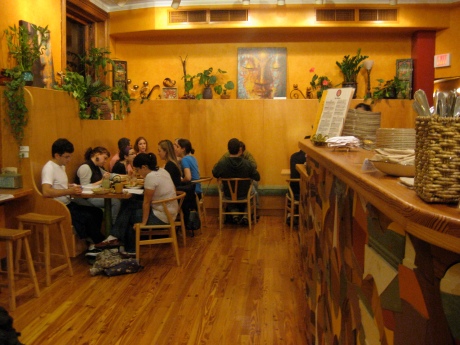
My favorite dish is The Explorer (pictured below, courtesy of the Life Alive website), but anything you order at Life Alive is perfectly seasoned, showcases the veggies you know and love and will feature a Life Alive specialty like the red lentil hummus scooped on top of this deliciously sweet and spicy salad.
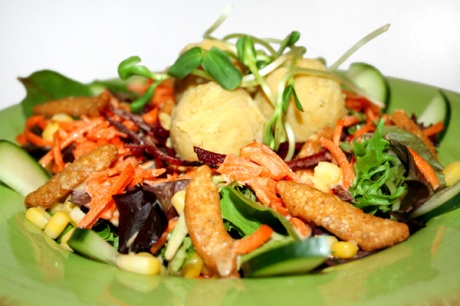 For the menu: “Our scrumdelyishus homemade lowfat Red Lentil Hummus, paired with sesame crunches, sundried tomatoes, cucumber, corn, spring mix and a sprinkle of shredded carrots and beets all traveling together with our fantastic honey wasabi vinaigrette. A dreamy destination!”
For the menu: “Our scrumdelyishus homemade lowfat Red Lentil Hummus, paired with sesame crunches, sundried tomatoes, cucumber, corn, spring mix and a sprinkle of shredded carrots and beets all traveling together with our fantastic honey wasabi vinaigrette. A dreamy destination!”
Eating local…Out of town
September 2, 2010
Local Harvest is a resource website and catalouge that maps local and organic food hubs across the country. Whenever I’m due for a vacation my first stop is Local Harvest. I’ve found some amazing restaurants this way: Local 188 in Portland, ME and Garden at The Cellar in Cambridge, MA. The website will also tell you where to find CSAs, farmers markets, and sustainable meat, among other things. Getting excited for a weekend in Northampton, MA to celebrate 2 years with my boyfriend, I happily plunked in the zip code at Local Harvest, only to find nothing. Bummed, we took off without knowing where to eat.
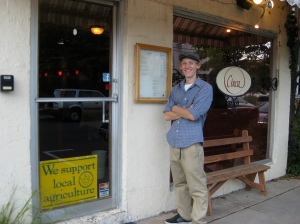 No need for Local Harvest in that town, restaurants that serve local food proudly post a sign in their windows: We Support Local Agriculture. The short main strip (Main Street) is sprinkled with local gems. My favorite joint was The Dirty Truth–sporting a big wooden sign with small metal letters, you almost have to know where it is to find it. A dimly lit and long red room extends behind the door. One wall has mural-sized local artwork and seat-yourself booths and tables, the other a mahogany bar in front of mirrors. A stacked beer list and creative bar food menu brought Seth and I back for another round the next night. In the true spirit of the season, the chef salad that weekend was a local heirloom caprese. The tastiest was their bahn mi, a franco-vietnamese sandwich with duck confit, pickled carrots and daikon, cucumber, fresh cilantro, mayo, and fish sauce, served with fresh-cut russet fries.
No need for Local Harvest in that town, restaurants that serve local food proudly post a sign in their windows: We Support Local Agriculture. The short main strip (Main Street) is sprinkled with local gems. My favorite joint was The Dirty Truth–sporting a big wooden sign with small metal letters, you almost have to know where it is to find it. A dimly lit and long red room extends behind the door. One wall has mural-sized local artwork and seat-yourself booths and tables, the other a mahogany bar in front of mirrors. A stacked beer list and creative bar food menu brought Seth and I back for another round the next night. In the true spirit of the season, the chef salad that weekend was a local heirloom caprese. The tastiest was their bahn mi, a franco-vietnamese sandwich with duck confit, pickled carrots and daikon, cucumber, fresh cilantro, mayo, and fish sauce, served with fresh-cut russet fries.
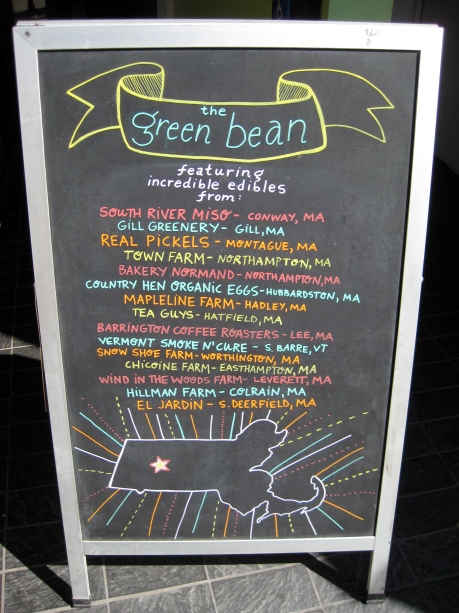 As Seth munched on a burger we wondered how it would compare to the patties across the street at the sustainable fast food joint Local Burger. “At Local Burger, you’ll always know where your food came from and exactly what’s in it.” That’s right folks, they list the farm of origin on the menu. Even still, I’m more of a slow food type of girl so the next day we went up the street to The Green Bean. We walked past the proud chalk board map of Mass listing the restaurant’s distributors and into a very crowded breakfast/lunch cafe. Soon after, a man joined the line behind us saying “This used to be the best kept secret in Northampton”.
As Seth munched on a burger we wondered how it would compare to the patties across the street at the sustainable fast food joint Local Burger. “At Local Burger, you’ll always know where your food came from and exactly what’s in it.” That’s right folks, they list the farm of origin on the menu. Even still, I’m more of a slow food type of girl so the next day we went up the street to The Green Bean. We walked past the proud chalk board map of Mass listing the restaurant’s distributors and into a very crowded breakfast/lunch cafe. Soon after, a man joined the line behind us saying “This used to be the best kept secret in Northampton”.
Don’t skip out on dessert now, GoBerry Frozen Yogurt comes from MA dairy farms. On your way out of town be sure to pick up a copy of Edible Pioneer Valley from Cooks Shop Here.
YUM
April 27, 2010
 As a part of an anthropology class at Tufts, I have been working with an Italian restaurant in Teele Square in Somerville. YUM: A Taste of Immigrant City has been an on-going project to study and support thirteen first and second generation immigrant owned restaurants. The class is involved with Project PERIS (Partnering for Economic Recovery Impacts through Service), where Tufts faculty and their courses are paired with local non-profits. ANTH 149: Economic Anthropology, The Very Social Business of Survival was teamed with The Welcome Project, an organization that works to diminish racism and empower the immigrant community in Somerville. Along with putting out a YUM Restaurant Card that offers a 10% discount at all of the participating restaurants, The Welcome Project as organized a big kick off event to take place this Friday at Arts and the Armory on Highland Ave. Purchase tickets for the event here.
As a part of an anthropology class at Tufts, I have been working with an Italian restaurant in Teele Square in Somerville. YUM: A Taste of Immigrant City has been an on-going project to study and support thirteen first and second generation immigrant owned restaurants. The class is involved with Project PERIS (Partnering for Economic Recovery Impacts through Service), where Tufts faculty and their courses are paired with local non-profits. ANTH 149: Economic Anthropology, The Very Social Business of Survival was teamed with The Welcome Project, an organization that works to diminish racism and empower the immigrant community in Somerville. Along with putting out a YUM Restaurant Card that offers a 10% discount at all of the participating restaurants, The Welcome Project as organized a big kick off event to take place this Friday at Arts and the Armory on Highland Ave. Purchase tickets for the event here.
Along with writing an ethnographic description and writing thematic pieces about our restaurants, we are also to write a food review. That’s right folks, going out to eat is a course requirement. Here is my review of a meal at Amelia’s:
I can’t say that I wasn’t predetermined to the like the pancetta. Before ordering I had admired the photo of 12 year old Delio Susi in a white apron. He stood shyly in front the family butcher shop in Boston’s North End, 1963. Today, Delio and his son cure meats at Amelia’s Kitchen in Teele Square in Somerville, a skill the restaurant owner learned from his uncle and brother long before the thought of opening Amelia’s. Usually a vegetarian, I was sure the baby spinach salad that featured the thinly sliced and carefully fried meat would be worth it. There was no need for dressing this salad as the ribboned shallots held the flavor of a balsamic vinaigrette, balancing the salt and smoke of the firm but tender pancetta.
Visiting the restaurant to film a YouTube review the day before, my mind was fresh with the history and pride displayed on the walls of the place. As I pointed out some of the pieces to my friend, I realized I felt pride in knowing about them. There was no doubt that having learned about Amelia’s would make the food taste better. I told my friend about the house-made pastas and insisted on trying the famous marinara with a secret ingredient. We settled on the toasted ravioli for an appetizer. Almost like a pot pie crust on the outside, the pasta was filled with firm and creamy ricotta and basil. I spooned up all the sauce while my friend photographed her tortellini primavera.
When I walked in and was greeted happily by Mr. Susi, I knew I had to try a pizza as my main course. While most of the recipes on the menu come from his late wife Amelia, he brings the pizza dough to the table. The high crust, with its tiny grain and moist center was crisped on the bottom. I ditched the fork and knife after the first bite. The margherita pizza was sweet with fresh cherry tomatoes, complemented by pieces of barely bitter basil. When I returned home and offered a left over slice to my roommate, she gobbled it up and mentioned future plans to order for delivery. I thought, “Why delivery when you can go to Amelia’s and eat the walls?”
Amelia’s Kitchen
1137 Broadway Somerville, MA
Est. April 25, 1995
Owner: Delio Susi
Cuisine: south central Italy
Mon-Sat 11am-11pm, Sun 5pm-10pm
(617) 776-2800



